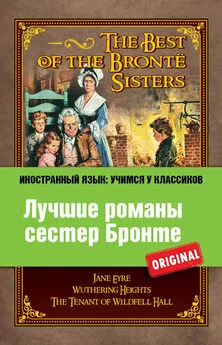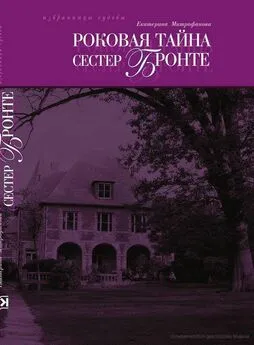Шарлотта Бронте - Лучшие романы сестер Бронте / The best of the Brontë sisters
- Название:Лучшие романы сестер Бронте / The best of the Brontë sisters
- Автор:
- Жанр:
- Издательство:Литагент «Эксмо»334eb225-f845-102a-9d2a-1f07c3bd69d8
- Год:2013
- Город:Москва
- ISBN:978-5-699-61892-7
- Рейтинг:
- Избранное:Добавить в избранное
-
Отзывы:
-
Ваша оценка:
Шарлотта Бронте - Лучшие романы сестер Бронте / The best of the Brontë sisters краткое содержание
«Иностранный язык: учимся у классиков» – это только оригинальные тексты лучших произведений мировой литературы. Эти книги станут эффективным и увлекательным пособием для изучающих иностранный язык на хорошем «продолжающем» и «продвинутом» уровне. Они помогут эффективно расширить словарный запас, подскажут, где и как правильно употреблять устойчивые выражения и грамматические конструкции, просто подарят радость от чтения. В конце книги дана краткая информация о культуроведческих, страноведческих, исторических и географических реалиях описываемого периода, которая поможет лучше ориентироваться в тексте произведения.
Серия «Иностранный язык: учимся у классиков» адресована широкому кругу читателей, хорошо владеющих английским языком и стремящихся к его совершенствованию.
Лучшие романы сестер Бронте / The best of the Brontë sisters - читать онлайн бесплатно ознакомительный отрывок
Интервал:
Закладка:
“Then you will not yield?”
“No.”
“Then you condemn me to live wretched and to die accursed?” His voice rose.
“I advise you to live sinless, and I wish you to die tranquil.”
“Then you snatch love and innocence from me? You fling me back on lust for a passion – vice for an occupation?”
“Mr. Rochester, I no more assign this fate to you than I grasp at it for myself. We were born to strive and endure – you as well as I: do so. You will forget me before I forget you.”
“You make me a liar by such language: you sully my honour. I declared I could not change: you tell me to my face I shall change soon. And what a distortion in your judgment, what a perversity in your ideas, is proved by your conduct! Is it better to drive a fellow-creature to despair than to transgress a mere human law, no man being injured by the breach? for you have neither relatives nor acquaintances whom you need fear to offend by living with me?”
This was true: and while he spoke my very conscience and reason turned traitors against me, and charged me with crime in resisting him. They spoke almost as loud as Feeling: and that clamoured wildly. “Oh, comply!” it said. “Think of his misery; think of his danger – look at his state when left alone; remember his headlong nature; consider the recklessness following on despair – soothe him; save him; love him; tell him you love him and will be his. Who in the world cares for you ? or who will be injured by what you do?”
Still indomitable was the reply – “ I care for myself. The more solitary, the more friendless, the more unsustained I am, the more I will respect myself. I will keep the law given by God; sanctioned by man. I will hold to the principles received by me when I was sane, and not mad – as I am now. Laws and principles are not for the times when there is no temptation: they are for such moments as this, when body and soul rise in mutiny against their rigour; stringent are they; inviolate they shall be. If at my individual convenience I might break them, what would be their worth? They have a worth – so I have always believed; and if I cannot believe it now, it is because I am insane – quite insane: with my veins running fire, and my heart beating faster than I can count its throbs. Preconceived opinions, foregone determinations, are all I have at this hour to stand by: there I plant my foot.”
I did. Mr. Rochester, reading my countenance, saw I had done so. His fury was wrought to the highest: he must yield to it for a moment, whatever followed; he crossed the floor and seized my arm and grasped my waist. He seemed to devour me with his flaming glance: physically, I felt, at the moment, powerless as stubble exposed to the draught and glow of a furnace: mentally, I still possessed my soul, and with it the certainty of ultimate safety. The soul, fortunately, has an interpreter – often an unconscious, but still a truthful interpreter – in the eye. My eye rose to his; and while I looked in his fierce face I gave an involuntary sigh; his gripe was painful, and my over-taxed strength almost exhausted.
“Never,” said he, as he ground his teeth, “never was anything at once so frail and so indomitable. A mere reed she feels in my hand!” (And he shook me with the force of his hold.) “I could bend her with my finger and thumb: and what good would it do if I bent, if I uptore, if I crushed her? Consider that eye: consider the resolute, wild, free thing looking out of it, defying me, with more than courage – with a stern triumph. Whatever I do with its cage, I cannot get at it – the savage, beautiful creature! If I tear, if I rend the slight prison, my outrage will only let the captive loose. Conqueror I might be of the house; but the inmate would escape to heaven before I could call myself possessor of its clay dwelling-place. And it is you, spirit – with will and energy, and virtue and purity – that I want: not alone your brittle frame. Of yourself you could come with soft flight and nestle against my heart, if you would: seized against your will, you will elude the grasp like an essence – you will vanish ere I inhale your fragrance. Oh! come, Jane, come!”
As he said this, he released me from his clutch, and only looked at me. The look was far worse to resist than the frantic strain: only an idiot, however, would have succumbed now. I had dared and baffled his fury; I must elude his sorrow: I retired to the door.
“You are going, Jane?”
“I am going, sir.”
“You are leaving me?”
“Yes.”
“You will not come? You will not be my comforter, my rescuer? My deep love, my wild woe, my frantic prayer, are all nothing to you?”
What unutterable pathos was in his voice! How hard it was to reiterate firmly, “I am going.”
“Jane!”
“Mr. Rochester!”
“Withdraw, then, – I consent; but remember, you leave me here in anguish. Go up to your own room; think over all I have said, and, Jane, cast a glance on my sufferings – think of me.”
He turned away; he threw himself on his face on the sofa. “Oh, Jane! my hope – my love – my life!” broke in anguish from his lips. Then came a deep, strong sob.
I had already gained the door; but, reader, I walked back – walked back as determinedly as I had retreated. I knelt down by him; I turned his face from the cushion to me; I kissed his cheek; I smoothed his hair with my hand.
“God bless you, my dear master!” I said. “God keep you from harm and wrong – direct you, solace you – reward you well for your past kindness to me.”
“Little Jane’s love would have been my best reward,” he answered; “without it, my heart is broken. But Jane will give me her love: yes – nobly, generously.”
Up the blood rushed to his face; forth flashed the fire from his eyes; erect he sprang; he held his arms out; but I evaded the embrace, and at once quitted the room.
“Farewell!” was the cry of my heart as I left him. Despair added, “Farewell for ever!”
That night I never thought to sleep; but a slumber fell on me as soon as I lay down in bed. I was transported in thought to the scenes of childhood: I dreamt I lay in the red-room at Gateshead; that the night was dark, and my mind impressed with strange fears. The light that long ago had struck me into syncope, recalled in this vision, seemed glidingly to mount the wall, and tremblingly to pause in the centre of the obscured ceiling. I lifted up my head to look: the roof resolved to clouds, high and dim; the gleam was such as the moon imparts to vapours she is about to sever. I watched her come – watched with the strangest anticipation; as though some word of doom were to be written on her disk. She broke forth as never moon yet burst from cloud: a hand first penetrated the sable folds and waved them away; then, not a moon, but a white human form shone in the azure, inclining a glorious brow earthward. It gazed and gazed on me. It spoke to my spirit: immeasurably distant was the tone, yet so near, it whispered in my heart –
“My daughter, flee temptation.”
“Mother, I will.”
So I answered after I had waked from the trance-like dream. It was yet night, but July nights are short: soon after midnight, dawn comes. “It cannot be too early to commence the task I have to fulfil,” thought I. I rose: I was dressed; for I had taken off nothing but my shoes. I knew where to find in my drawers some linen, a locket, a ring. In seeking these articles, I encountered the beads of a pearl necklace Mr. Rochester had forced me to accept a few days ago. I left that; it was not mine: it was the visionary bride’s who had melted in air. The other articles I made up in a parcel; my purse, containing twenty shillings (it was all I had), I put in my pocket: I tied on my straw bonnet, pinned my shawl, took the parcel and my slippers, which I would not put on yet, and stole from my room.
“Farewell, kind Mrs. Fairfax!” I whispered, as I glided past her door. “Farewell, my darling Adèle!” I said, as I glanced towards the nursery. No thought could be admitted of entering to embrace her. I had to deceive a fine ear: for aught I knew it might now be listening.
I would have got past Mr. Rochester’s chamber without a pause; but my heart momentarily stopping its beat at that threshold, my foot was forced to stop also. No sleep was there: the inmate was walking restlessly from wall to wall; and again and again he sighed while I listened. There was a heaven – a temporary heaven – in this room for me, if I chose: I had but to go in and to say –
“Mr. Rochester, I will love you and live with you through life till death,” and a fount of rapture would spring to my lips. I thought of this.
That kind master, who could not sleep now, was waiting with impatience for day. He would send for me in the morning; I should be gone. He would have me sought for: vainly. He would feel himself forsaken; his love rejected: he would suffer; perhaps grow desperate. I thought of this too. My hand moved towards the lock: I caught it back, and glided on.
Drearily I wound my way downstairs: I knew what I had to do, and I did it mechanically. I sought the key of the side-door in the kitchen; I sought, too, a phial of oil and a feather; I oiled the key and the lock. I got some water, I got some bread: for perhaps I should have to walk far; and my strength, sorely shaken of late, must not break down. All this I did without one sound. I opened the door, passed out, shut it softly. Dim dawn glimmered in the yard. The great gates were closed and locked; but a wicket in one of them was only latched. Through that I departed: it, too, I shut; and now I was out of Thornfield.
A mile off, beyond the fields, lay a road which stretched in the contrary direction to Millcote; a road I had never travelled, but often noticed, and wondered where it led: thither I bent my steps. No reflection was to be allowed now: not one glance was to be cast back; not even one forward. Not one thought was to be given either to the past or the future. The first was a page so heavenly sweet – so deadly sad – that to read one line of it would dissolve my courage and break down my energy. The last was an awful blank: something like the world when the deluge was gone by.
I skirted fields, and hedges, and lanes till after sunrise. I believe it was a lovely summer morning: I know my shoes, which I had put on when I left the house, were soon wet with dew. But I looked neither to rising sun, nor smiling sky, nor wakening nature. He who is taken out to pass through a fair scene to the scaffold, thinks not of the flowers that smile on his road, but of the block and axe-edge; of the disseverment of bone and vein; of the grave gaping at the end: and I thought of drear flight and homeless wandering – and oh! with agony I thought of what I left. I could not help it. I thought of him now – in his room – watching the sunrise; hoping I should soon come to say I would stay with him and be his. I longed to be his; I panted to return: it was not too late; I could yet spare him the bitter pang of bereavement. As yet my flight, I was sure, was undiscovered. I could go back and be his comforter – his pride; his redeemer from misery, perhaps from ruin. Oh, that fear of his self-abandonment – far worse than my abandonment – how it goaded me! It was a barbed arrow-head in my breast; it tore me when I tried to extract it; it sickened me when remembrance thrust it farther in. Birds began singing in brake and copse: birds were faithful to their mates; birds were emblems of love. What was I? In the midst of my pain of heart and frantic effort of principle, I abhorred myself. I had no solace from self-approbation: none even from self-respect. I had injured – wounded – left my master. I was hateful in my own eyes. Still I could not turn, nor retrace one step. God must have led me on. As to my own will or conscience, impassioned grief had trampled one and stifled the other. I was weeping wildly as I walked along my solitary way: fast, fast I went like one delirious. A weakness, beginning inwardly, extending to the limbs, seized me, and I fell: I lay on the ground some minutes, pressing my face to the wet turf. I had some fear – or hope – that here I should die: but I was soon up; crawling forwards on my hands and knees, and then again raised to my feet – as eager and as determined as ever to reach the road.
Читать дальшеИнтервал:
Закладка:










